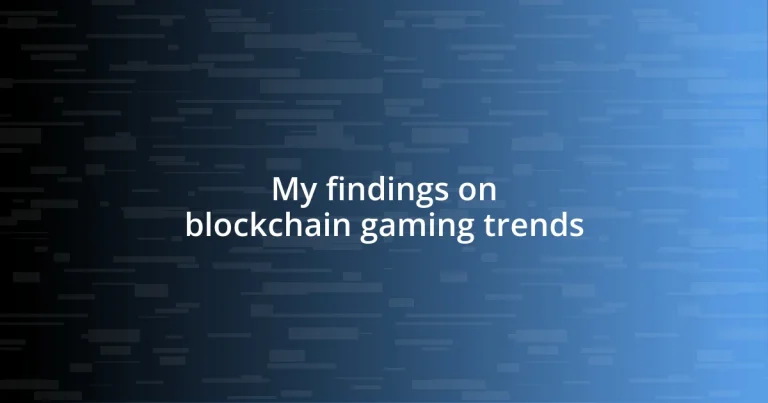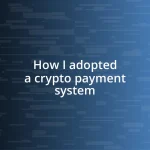Key takeaways:
- Blockchain gaming enables true ownership of in-game assets, enhancing player engagement and fostering community interaction.
- The market for blockchain gaming is rapidly growing, projected to reach $50 billion by 2025 with over 1 million daily active users.
- The integration of technologies like NFTs and smart contracts transforms player experiences, allowing for real-world value and unique asset ownership in gaming.
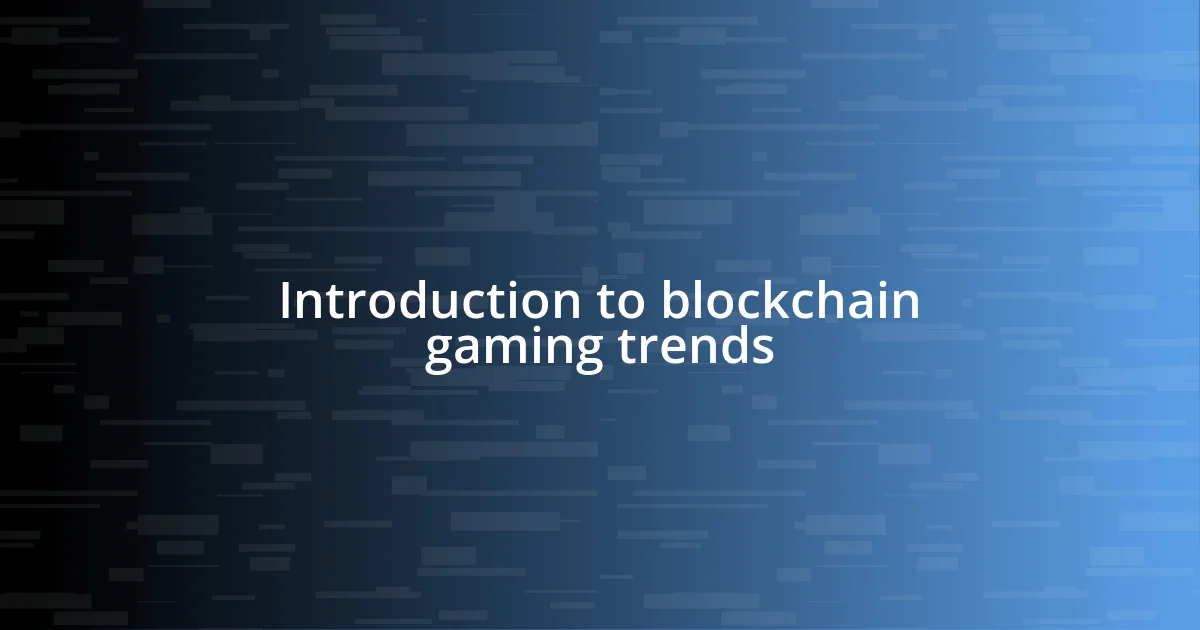
Introduction to blockchain gaming trends
Blockchain gaming is reshaping how we perceive digital play, merging entertainment with decentralized finance. I vividly recall the first time I experienced a game that utilized cryptocurrency for rewards; it felt like stepping into a new digital frontier where my in-game achievements held real-world value. Isn’t it exciting to think about a future where your gaming skills could translate into tangible assets?
As I delved deeper into this world, I was struck by how blockchain technology empowers players with true ownership of in-game assets. Imagine spending countless hours building your character or perfecting your strategy, knowing that the items you acquire aren’t just ephemeral, but can actually be sold or traded. This shift is not merely about creating a more engaging experience; it raises intriguing questions about what it means to be a player in a digital economy.
Furthermore, the social aspects of blockchain gaming cannot be overlooked. Communities are forming around these games, connected by shared interests and the thrill of both competition and collaboration. I’ve found these interactions to be incredibly enriching, as players from around the world come together to exchange tips, trade assets, and celebrate achievements. Isn’t it fascinating how technology is transforming not just the games we play, but the very fabric of our social interactions?
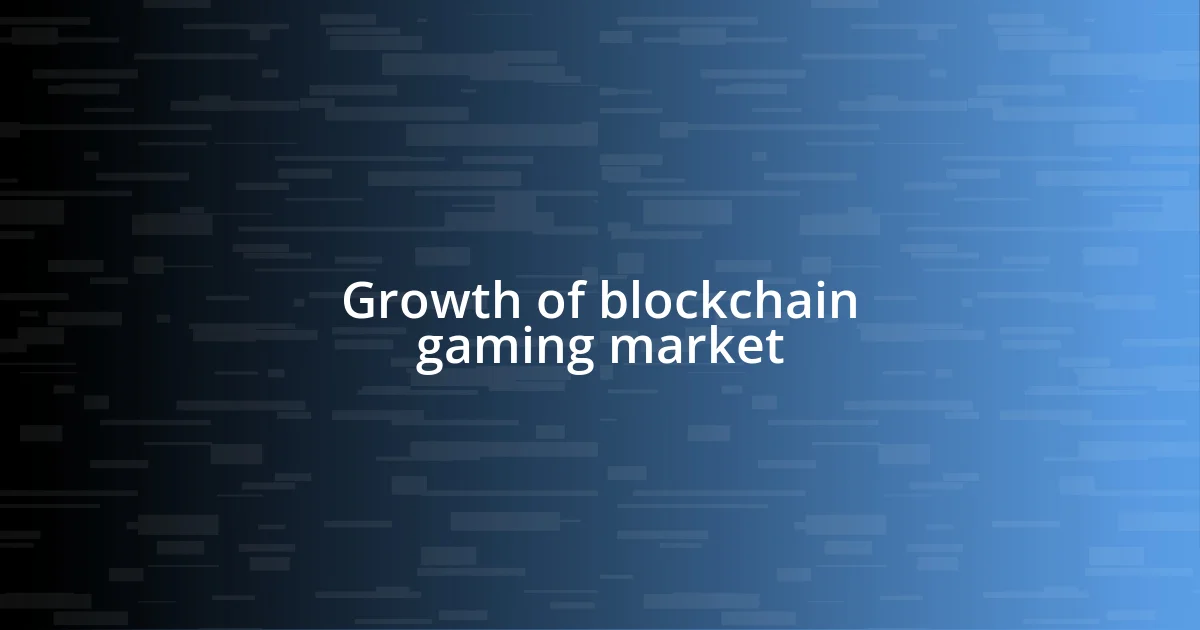
Growth of blockchain gaming market
The growth of the blockchain gaming market has been nothing short of astounding. I’ve noticed a significant uptick in players enthusiastically adopting games that utilize blockchain technology, which offers them true ownership of their digital possessions. This shift not only enhances player engagement but also sparks intriguing conversations about the future of gaming and the economy surrounding it.
- The blockchain gaming market is expected to reach $50 billion by 2025, showcasing its immense potential.
- Over 1 million daily active users are engaging with blockchain games, highlighting a growing community.
- Numerous game developers are pivoting towards integrating blockchain, driven by the demand for innovative gaming experiences.
Reflecting on my own experiences, I remember the thrill of joining a newly launched blockchain game and instantly feeling connected to a global player base. We were all eager to explore this uncharted territory together. The excitement was palpable as players shared strategies and quickly adapted to the unique mechanics of these games, underscoring how this market fosters not just individual play, but community growth. Seeing the dynamic and evolving trends has reaffirmed my belief in the transformative power of blockchain in the gaming sector.
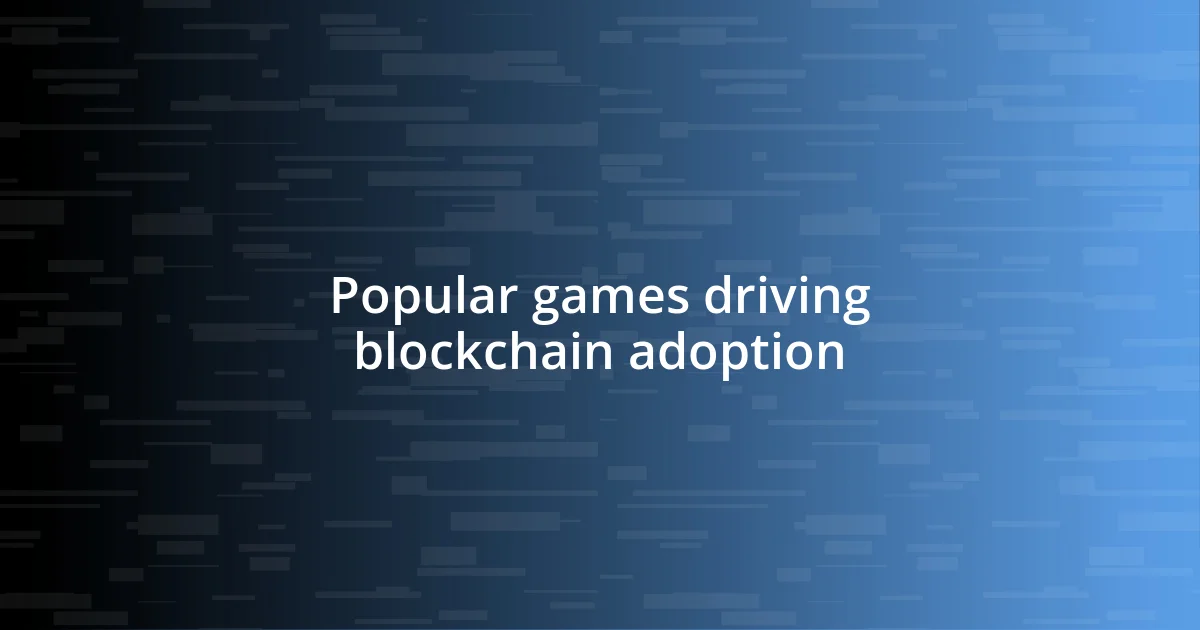
Popular games driving blockchain adoption
The landscape of blockchain gaming is being shaped by a few standout games that are really pushing boundaries and driving adoption. One game that comes to mind is Axie Infinity. I fondly remember the first time I participated in its battles; it felt like not just a game but a community. Players like myself could earn while engaging in fun matches, and it opened my eyes to how blockchain can create a genuine economic ecosystem within gaming.
Another notable title is Decentraland, which has certainly caught my attention. The concept of owning virtual land is incredibly fascinating. I recall spending hours exploring digital landscapes, engaging with other players, and trading virtual real estate. The sense of ownership in a purely digital environment is exhilarating, evoking a thrill that traditional gaming seldom provides.
Ultimately, titles like The Sandbox and Illuvium are also making waves. What I love about these games is the creativity they ignite. As I navigated through the user-generated experiences in The Sandbox, I couldn’t help but feel a rush of inspiration, realizing that players aren’t just consumers but also creators within this space.
| Game Title | Key Features Driving Adoption |
|---|---|
| Axie Infinity | Play-to-earn mechanics with battles and breeding |
| Decentraland | Virtual real estate ownership and social interaction |
| The Sandbox | User-generated content and creativity |
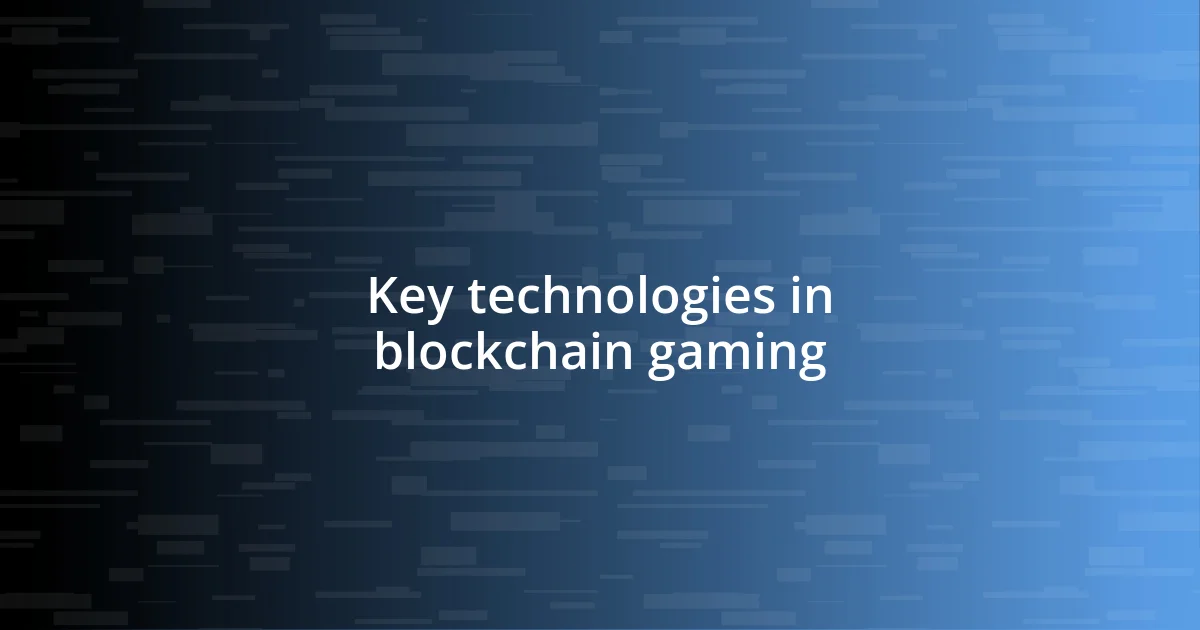
Key technologies in blockchain gaming
When I delve into the key technologies powering blockchain gaming, smart contracts immediately come to mind. These self-executing contracts with the terms of the agreement directly written into code revolutionize how transactions occur in games. I recall playing a game where my in-game purchases were secured by smart contracts, which gave me peace of mind knowing my virtual assets were protected and transparent.
Another crucial technology is non-fungible tokens (NFTs), which allow players to truly own their digital items. I remember the excitement of acquiring a rare weapon in a blockchain game, a moment that felt exhilarating because it wasn’t just an item; it was a unique piece of my gaming history. This instilled a sense of pride in my collection, highlighting how NFTs can amplify the emotional connection a player has with their possessions.
Lastly, decentralized finance (DeFi) mechanisms are increasingly woven into the fabric of blockchain gaming. Just think about it—earning yield on your in-game assets? It’s a game-changer. I once experimented with staking my tokens from a blockchain game, and the sense of generating passive income while playing added a new layer of strategy to my gameplay experience. This fusion of DeFi and gaming not only enhances player engagement but reshapes how we perceive value in virtual environments.
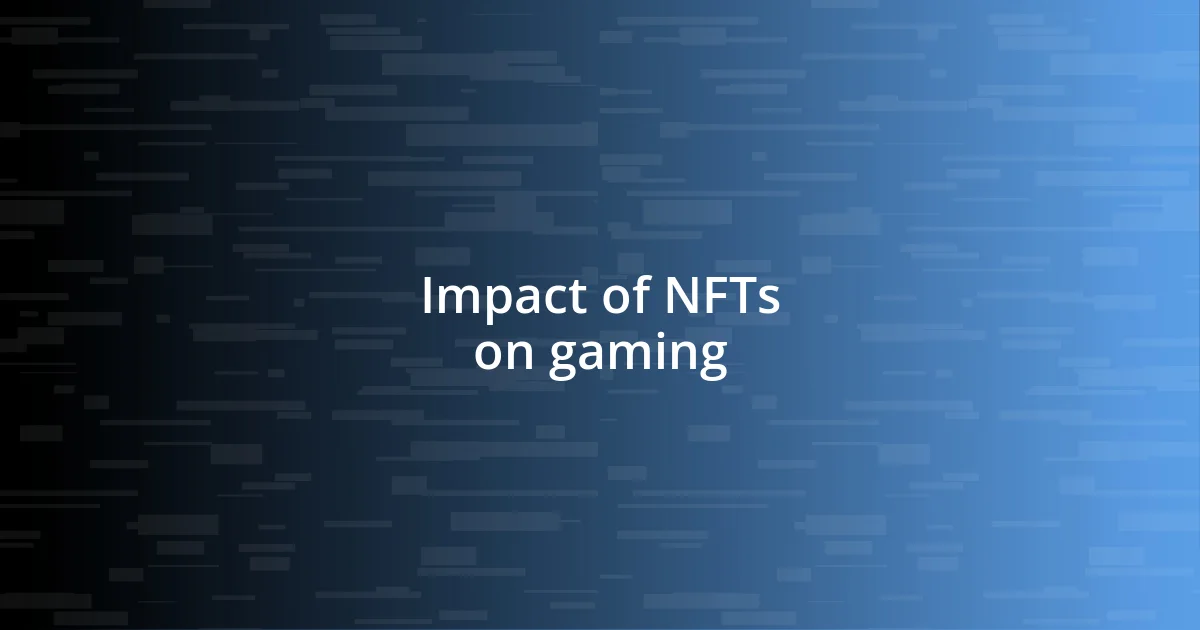
Impact of NFTs on gaming
The advent of NFTs has truly transformed the gaming landscape, acting like a bridge between virtual treasures and real-world value. I vividly recall the thrill I experienced when I first sold an NFT I created in a game—a digital artwork that not only showcased my creativity but also earned me actual income. It made me wonder, how often do we encounter such a blend of art and financial opportunity in traditional gaming?
Owning NFTs in games ignites a sense of pride and identity among players. I can still feel the rush of excitement when I unlocked a limited edition item; it was not just a trophy, but a badge of honor. This emotional connection to digital assets fosters a deeper engagement, making players feel integral to the game’s ecosystem rather than just participants. Isn’t it fascinating how a mere digital image can invoke such strong feelings?
Moreover, NFTs empower players in unprecedented ways, enabling them to trade their unique assets with others directly and securely. I remember trading an NFT with a fellow gamer, and the nature of that interaction felt revolutionary—no middleman, just two enthusiasts connecting over shared interests. This democratization of asset ownership creates vibrant communities where collaboration and commerce coexist. How do you think this will shape the future of gaming?
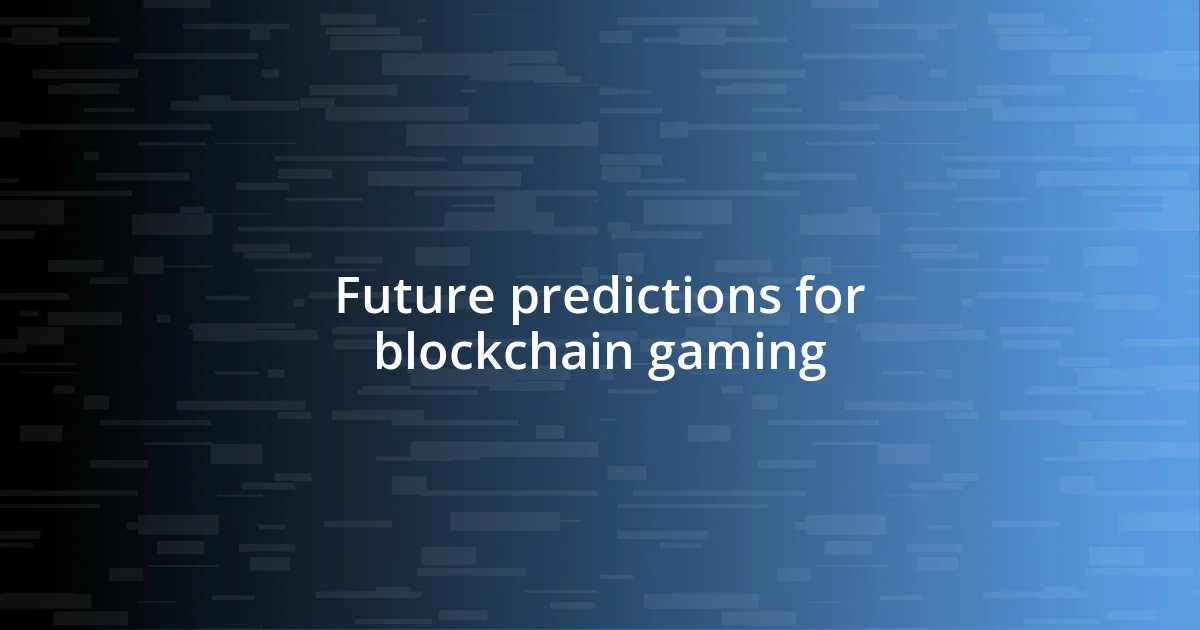
Future predictions for blockchain gaming
The future of blockchain gaming is undeniably exciting, especially as I foresee significant advancements in player agency. Imagine games where players not only affect the narrative but also have tangible stakes in the world’s economy. I recall a time in a game where my choices directly influenced its outcome, and I can’t help but think how empowering it would be if those choices had real-world implications through blockchain technology.
As gaming communities grow more interconnected through decentralized platforms, I believe we’ll witness a rise in cooperative gameplay where players collaborate not just in-game, but also in building the game’s economy. I remember the thrill of working alongside friends to construct a virtual kingdom, but what if our efforts could translate into actual rewards in crypto? This could create a sense of shared responsibility and achievement that enhances the gaming experience.
Furthermore, the integration of virtual reality (VR) with blockchain is on the horizon and could redefine immersive experiences altogether. I often dream about stepping into a game with fully realized ownership of my assets; the thought sends shivers down my spine. Wouldn’t it be amazing to physically explore a world where my investments in digital items feel as real as my favorite collectibles? It’s exhilarating to think about how such innovations could redefine not just gaming but also our social interactions within these digital realms.












